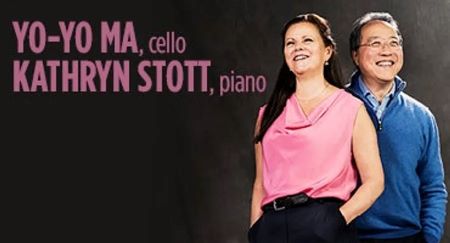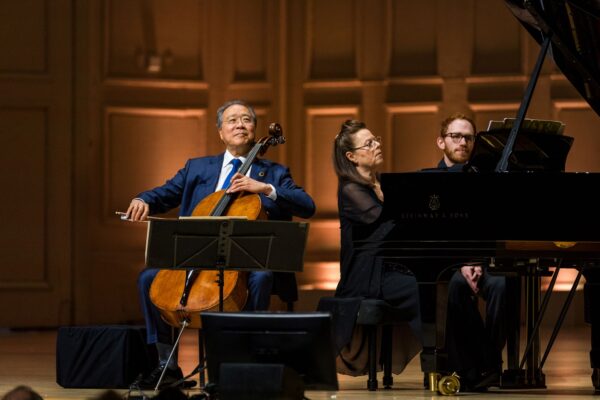AN EVENING WITH FRIENDS
Yo-Yo Ma, superstar of the cello and more importantly, of bringing together music of disparate cultures, performed with his long-time musical partner Kathryn Stott at Boston’s Symphony Hall last night. Stott has announced her intention to retire from performing at the end of the year, so this was likely the last time the two of them would perform together in Boston.
Stott put together the concert program, which began with five pieces played in succession as a single set. These included Gabriel Fauré’s Berceuse; AntonÃn Dvorák’s “Songs My Mother Taught Me,” No. 4; Sérgio Assad’s Menino; Nadia Boulanger’s Cantique; and Gabriel Fauré’s Papillon. Stott’s approach to the piano was gentle, even cautious on the Berceuse but became more assertive as the pair moved into the Dvorak. Boulanger’s Cantique was an important crossing point in the set: Ma and Stott trace their musical lineage to Boulanger. The famed conductor and composer was Stott’s teacher, and she was also the teacher of Luise Vosgerchian, Ma’s professor who, in his words, “liberated” him “from being a neurotic instrumentalist tethered to perfection and taught me how to approach with perspective, with humanity.” The set concluded with the buzzy and busy Papillon, played with a bright humor that gave this virtuoso piece by Boulanger’s friend and mentor Gabriel Fauré substance.
Only after the completion of this set did Ma introduce himself and Stott, reflecting on their nearly forty years of performing together and explaining that Cantique is a prayer and an expression of gratitude’”he expressed gratitude to Stott for her work with him and for designing the evening’s program. Those who have seen Ma and Stott perform together know that they sit with their backs to one another, Ma facing the audience, Stott perpendicular to him so the audience sees her in profile. Thus all their communication as performers seems to occur only through the music and their many hours and years of working together, not through eye contact or movements of the head or body, making their consonance all the more remarkable.
This set was followed by Dmitri Shostakovich’s Cello Sonata in D minor. Introduced by Ma as an example of “playing truth to power.” Written two years before his public denunciation by Stalin, the sonata is widely popular with musicians because of the many opportunities it offers both the cello its accompanist to explore a range of emotions and colors through a variety of rhythms and techniques. Ma’s handling of his cello was questing against Stott’s insistent and ominous piano, at times pulling a high-pitched wail from his instrument. Ma leaned back as he played, as though submitting to his cello. Stott, on the other hand, seemed to lean into her piano, as though hoping to submerge herself into it. As the intensity of the sonata built, they almost seemed to be playing a cross purposes to one another, and one couldn’t help but think of Shostakovich’s situation of balancing his musical aspirations against the political exigencies of his life under Stalin. Stott seemed quite capable of attacking the piano and did so as the Ma unleashed the pizzicato of his string’s final notes, seeming to leap backward from the cello as the sonata came to its explosive conclusion.
Following the intermission, the audience was treated to the beautiful and calming Spiegel im Spiegel, composed by Arvo Pärt, an Estonian who has spent much of his life in Germany. As Ma and Stott performed this beautiful piece exemplifying “the aesthetic of the tintinnabular” or bell-like triads, images of cosmic and terrestrial scenes captured by the James Webb and Hubble telescopes were projected onto a large screen behind the stage, creating a sense of profound tranquility. The technology that made such images available, Ma stated after the piece concluded, were examples of “collaboration combining passion, vision, and knowledge.” It was also an example of Ma’s current project, Our Common Nature, in which he celebrates “ways nature can reinvigorate the human experiment, reuniting us in pursuit of a common future.”
The planned program concluded with the Sonata in A Major for violin and piano by César Franck, adapted for cello by Jules Delsart. This was a piece that showed off Stott’s fluid piano technique and Ma’s contemplative bowing. In the second movement, Stott seemed to take command, with Ma playing along, and then they played together, clearly respecting one another and as equals, building to the fourth movement in which the two instruments echo one another in repeating the majestic and soaring theme as it builds to its satisfying conclusion.
Stott and Ma bowed to one another through the enthusiastic applause, and while Ma took his cello with him as he exited the stage, the audience’s insistent ovation forced a return with two short pieces: Ernest Bloch’s plaintive minor-key “Prayer” (the first movement of From Jewish Life) followed by Brazilian jazz composer César Camargo Mariano’s Cristal, a Yo-Yo Ma favorite.
photo by Robert Torres/Celebrity Series of Boston
Yo-Yo Ma, Cello Kathryn Stott piano
presented by Celebrity Series of Boston
reviewed at Symphony Hall, Boston, MA on April 9, 2024
for tour dates, visit Yo-Yo Ma and Kathryn Stott


